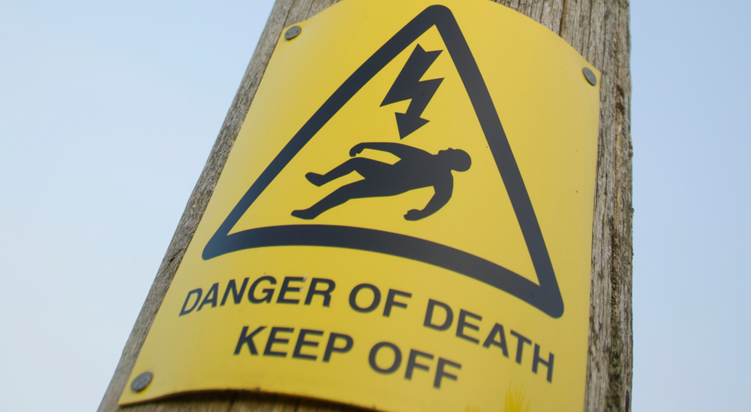Powerline Safety - Residential - Central - Liberty
Downed Power Line Safety
- Always stay away from power lines. Downed power lines may appear to be harmless, but could be energized and dangerous.
- If a person or object is in contact with a power line, do not touch the person, object, or line. The electric current could flow through to you. Call 911 and Liberty at 1-800-206-2300 (Electric & Water) immediately.
- If your vehicle comes into contact with a power line, stay inside. Warn others not to approach the vehicle or attempt to touch the vehicle or line.
- If you must leave your vehicle, jump clear to avoid being in contact with the car and the ground at the same time.
Power Line Safety Tips
- Keep yourself, your co-workers, friends, family, and vehicles at least 10 feet away from residential electric lines and equipment.
- Stay alert. Keep ladders at least 10 feet away from power lines when carrying, moving, and raising them.
- Keep away from wires when working with tools, pipe, lumber, or siding — all of which can conduct electricity.
- Also, be careful when you install or remove an antenna or work on a roof. Electrical wires could be above or below when working on a roof.
- Make sure the area is clear of wires before working near trees or shrubs.
- Never attach or tie anything off to power lines or electrical equipment.
- To further ensure your safety, consider all lines "energized" and put an effective ground on all equipment working near overhead electric lines.
- Be aware of nearby power lines the next time you prune trees or clean a pool.
- Keep kites, model airplanes, fishing poles, boats on trailers, sailboat masts, hang gliders, and parachutes away from power lines, as they can lead to dangerous or even tragic situations.
Why electricity can be dangerous
Electricity always seeks the shortest path to the ground. It tries to find a conductor, or something that it can pass through to get to the ground, like metal, wet wood, or water. Your body is about 70 percent water, so that makes you a good conductor, too. For example, if you touch an energized bare wire or faulty appliance while your feet are touching the ground, electricity will automatically pass through you to the ground, causing a harmful or even fatal shock.
Shock hazards
There are many potential shock hazards between the generation and use of electricity. Overhead power lines are located high off the ground for safety, have no insulation and can carry more than 500,000 volts. Substations and transformers contain "live" parts that are dangerous to contact. Underground power lines are well-insulated, but a shovel can damage them and create a shock hazard.

How much is too much?
It doesn't take much to get hurt or killed from even a small amount of electricity. The current from a 7.5 watt Christmas tree bulb can kill you in a fraction of a second if its current passes through your chest. So the best thing you can do is be aware of the dangers of electricity and learn how to avoid them.
When working outdoors, please be aware of the dangers of working near overhead power lines. Keep ladders and other equipment at least 10 feet away at all times. If you see a downed line, keep everyone a minimum of 30 feet away from it. That is approximately the length of a school bus. Once everyone is a safe distance away, report the downed wire to our emergency number at 1-800-206-2300 (Electric & Water), or call 911.
